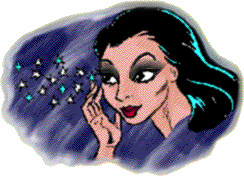Alcohol, Its Origins
(from a powder to a liquid)

Alcohol was originally a fine powder used for eye makeup probably even by Jezebel and Cleopatra.
Alcohol Isn’t What It Used To Be
- Koh’l is a Semitic word used in early Biblical references and is the Arabic word for antimony sulfide, a fine cosmetic powder, used as eye make-up by women of the Middle East. In such countries as India and Yemen, they even went so far as to throw the powder directly into their eyes to increase their brilliance or sparkle. Other women used the “normal” methods of application by making a paste of the powder and rubbing it on the eyelids.
- The original Arabic sense of pulverized antimony powder was the original purpose of “al kuhl”. It was refined by heating to a vapor, then condensed to a solid to achieve an extremely fine powder (so fine that a person couldn’t feel the separate grains when they were rubbed between the fingers) which was applied as an even stain for eye makeup.
- By the time “alcohol” entered English in the 16th century, its meaning had broadened to include “any fine powder, especially one derived by vaporizing a solid and then allowing the vapor to condense.” In 1753, liquid spirits which were derived by vaporization and condensation were also known as alcohols, the best known was alcohol (or spirit) of wine, and by extension, to the spirit of any fermented liquor.
- When Arabian alchemists invented the distillation of alcohol with a similar process in about 1,000 A.D., they used for the name of their product the cosmetic process, and alcohol has been doing weird things to eyes ever since.
- By the way, the antimony sulfide stone is still available in some Arabic countries.
Alcoholism: bourbonic plague.
One reason I don't drink is that I want to know when I am having a good time.
First you take a drink, then the drink takes a drink, then the drink takes you.
My experience through life has convinced me that, while moderation and temperance in all things are commendable and beneficial, abstinence from spirituous liquors is the best safeguard of morals and health.
The Oxford English Dictionary says:
- “They put betweene the eye-lids and the eye a certaine black powder...made from a minerall brought from the land of the Fez and called Alcohole....” (Sandys .trav 67, 1615)
- It appeared in English, as in most of the modern languages. in 16th century. Compare French, alcohol, now alcool.
- Originally, The fine metallic powder used in the East to stain the eyelids, etc.: powdered ore of antimony, stibnite, or antimony trisulphide; also, sometimes, powdered galena or lead ore.
- The Turkes have a Black Powder, made of a Mineral called Alcohole; which
with a fine long Pencil they lay under their Eye-lids. (1626 Bacon Sylva
739) - The ladies of Barbary tinge their hair, and the edges of their eyelids, with al-ka-hol, the powder of lead ore. That which is employed for ornament and is principally antimony, is called al-cohol or isphahany. (1819 Pantol. s.v.)
- The barbarous auctours use alchohol, or (as I fynde it sometymes wryten) alcofoll, for moost fine poudre. Alcofoll is Catalan. (1543, Traheron)
- Alcolismus, is an operation ... which reduceth a matter into allcool, the finest pouder that is. (1657, Physics Dictionary)
- The pure Substance of anything separated from the more Gross. It is more especially taken for a most subtil and highly refined Powder, and sometimes for a very pure Spirit: Thus the highest rectified Spirit of Wine is called Alcohol Vini. (1706, Phillips, Alcahol or Alcool)
- By extension to fluids of the idea of sublimation: An essence, quintessence, or spirit, obtained by distillation or rectification; as alcohol of wine, essence or spirit of wine. (1672, Philosophy Translation)
Related "alcohol" word family: alcoholo-, alcohol- unit.
